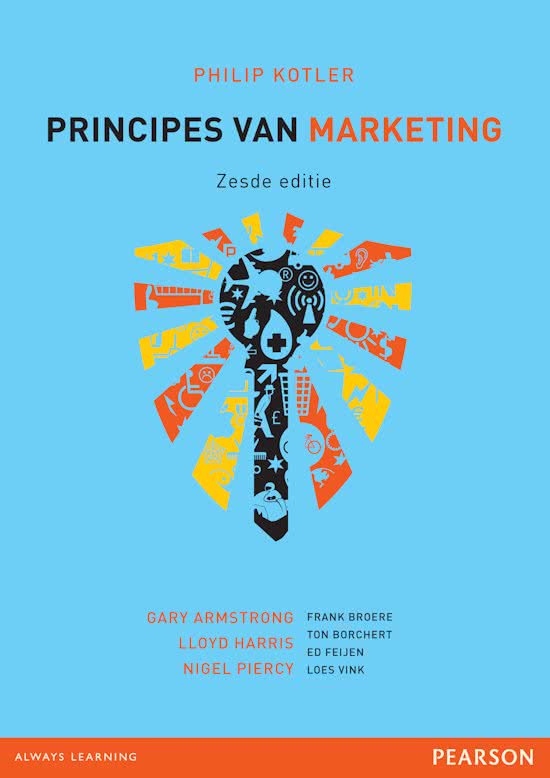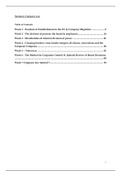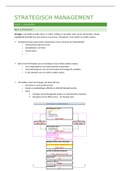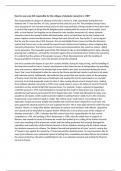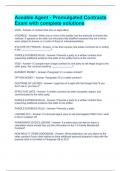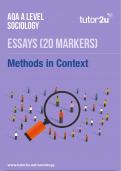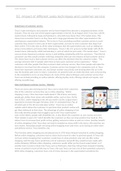Week 3
Key Terms:
- Schema: a stored framework of cognitive knowledge that represents information
about a topic, a concept, or a particular stimulus, including its attributes and the
relations among the attributes (Fiske and Linville 1980, quoted in article)
- Congruity: the state or quality of being congruous; harmony; appropriateness
(dictionary.com)
- Anthropomorphizing: seeing the human in non-human forms and events. Eg.
Seeing faces in clouds, seeing their cars as companions etc (article)
Anthropomorphism
• 3 reasons (Guthrie 1993)
1. Comforts ppl by providing rship/ companionship - ppl want more rships hence
use prods to fill the void
2. To make better sense of the world – to better account for things that they
know less off
3. Cognitive and perceptual strategy similar to making a bet that the world is
human-like
• 3 forms (Guthrie 1993)
1. Partial (focus of research) – seeing objects as having some important human
traits but don’t the object as a whole to be human; more relevant in a prod
context
2. Literal – believing that an object/ animal is actually a person; usually
mistaken perception eg mistaking stacked garbage for a person
3. Accidental – see elements of human for in inanimate objects, but considers it
to be coincidental. Eg seeing a face in the clouds
• Ease/ ability to anthropomorhize
o Depends on the presence of specific features. Eg (time-scaled) movement: If
something moves super fast, it may be seen more like insects instead of
human. If very slow, lack humanity; Other features – facial features, sounds,
imitation, communication ability
o Marketers using “s/he” instead of “it”; “prod family” instead of “prod line”.
Beyond that, suggest what type of person eg friend, spokesperson etc
o Encouraged by marketers. People form r/ships with brands (cos they have
distinct personalities/ images).
o 2 ways marketers do this:
1. Design anthropomorphized representation of the brand eg Tony the
Tiger, Michelin Man
2. Present product in human terms ß focus of this research
Reseach Question: Do such presentations affect the evaluation of the product, and if so,
how?
Hypothesis: Anthropomorphizing may affect evaluations through schema-based processing
Total of 3 studies
• The main prediction examined in our first two studies is that greater congruity
between features of a product and an activated human schema will lead to more
positive evaluations in the absence of strong category affect to the contrary.
• In a third study, we explore the role of category affect by examining the effect of the
match of a stimulus with human schema associated with strong negative versus
positive affect.
1
, è Efforts by marketers to anthropomorphize products may be viewed as shifting the category
of evaluation from product to human and, more specifically, to particular human categories
2
Key Terms:
- Schema: a stored framework of cognitive knowledge that represents information
about a topic, a concept, or a particular stimulus, including its attributes and the
relations among the attributes (Fiske and Linville 1980, quoted in article)
- Congruity: the state or quality of being congruous; harmony; appropriateness
(dictionary.com)
- Anthropomorphizing: seeing the human in non-human forms and events. Eg.
Seeing faces in clouds, seeing their cars as companions etc (article)
Anthropomorphism
• 3 reasons (Guthrie 1993)
1. Comforts ppl by providing rship/ companionship - ppl want more rships hence
use prods to fill the void
2. To make better sense of the world – to better account for things that they
know less off
3. Cognitive and perceptual strategy similar to making a bet that the world is
human-like
• 3 forms (Guthrie 1993)
1. Partial (focus of research) – seeing objects as having some important human
traits but don’t the object as a whole to be human; more relevant in a prod
context
2. Literal – believing that an object/ animal is actually a person; usually
mistaken perception eg mistaking stacked garbage for a person
3. Accidental – see elements of human for in inanimate objects, but considers it
to be coincidental. Eg seeing a face in the clouds
• Ease/ ability to anthropomorhize
o Depends on the presence of specific features. Eg (time-scaled) movement: If
something moves super fast, it may be seen more like insects instead of
human. If very slow, lack humanity; Other features – facial features, sounds,
imitation, communication ability
o Marketers using “s/he” instead of “it”; “prod family” instead of “prod line”.
Beyond that, suggest what type of person eg friend, spokesperson etc
o Encouraged by marketers. People form r/ships with brands (cos they have
distinct personalities/ images).
o 2 ways marketers do this:
1. Design anthropomorphized representation of the brand eg Tony the
Tiger, Michelin Man
2. Present product in human terms ß focus of this research
Reseach Question: Do such presentations affect the evaluation of the product, and if so,
how?
Hypothesis: Anthropomorphizing may affect evaluations through schema-based processing
Total of 3 studies
• The main prediction examined in our first two studies is that greater congruity
between features of a product and an activated human schema will lead to more
positive evaluations in the absence of strong category affect to the contrary.
• In a third study, we explore the role of category affect by examining the effect of the
match of a stimulus with human schema associated with strong negative versus
positive affect.
1
, è Efforts by marketers to anthropomorphize products may be viewed as shifting the category
of evaluation from product to human and, more specifically, to particular human categories
2


